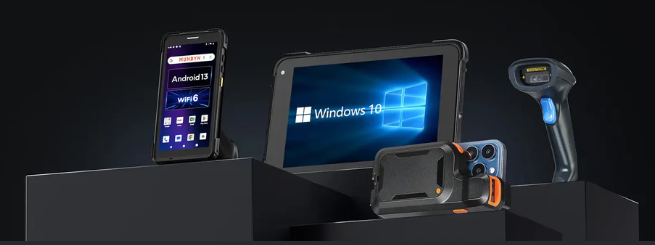TECH
How an Android Barcode Scanner Streamlines Workflows in Modern Industries

In today’s digital-first world, efficiency isn’t just a luxury—it’s a necessity. As businesses strive to streamline operations, reduce errors, and improve productivity, one tool has proven consistently effective across various industries: the Android barcode scanner. Whether you’re managing inventory in a warehouse, checking out customers at a retail store, or processing deliveries in a logistics center, this type of device plays a critical role in ensuring smooth operations.
Combining mobility, connectivity, and smart data capture, Android barcode scanners are now considered essential in environments that rely on speed, accuracy, and data tracking. But what exactly makes them so valuable? And how do they contribute to everyday tasks across different sectors?
What is an Android Barcode Scanner?
An Android barcode scanner is a handheld or tablet-based device that runs on the Android operating system and is equipped with built-in scanning capabilities. These devices can read barcodes—1D and 2D—using laser or imaging technology and process the information through various software applications.
Unlike traditional barcode scanners, Android-based versions offer added functionality due to their mobile OS. That means users can download and run apps, connect to Wi-Fi or cellular networks, and integrate the scanner with other systems like point-of-sale software, inventory management platforms, or delivery tracking apps.
Key Advantages of Android Barcode Scanners
What sets Android barcode scanners apart from other scanning solutions is their versatility and smart features. Here’s why they’ve become so popular:
1. All-in-One Functionality
Rather than needing separate tools for scanning, data entry, and communication, an Android barcode scanner combines them all. You can scan a product, check stock levels, update inventory, and send the data to a central database—all from one device.
2. Mobility and Connectivity
Because these devices run on Android, they support wireless connectivity such as Wi-Fi, 4G, and Bluetooth. That makes them ideal for mobile use—whether on the warehouse floor, in the retail aisle, or out in the field.
3. User-Friendly Interface
Most people are already familiar with Android devices, so training new users tends to be quick and easy. The touch-screen interface and customizable apps make navigation intuitive, even for beginners.
4. Real-Time Data Processing
One of the most valuable features is the ability to process data in real time. As soon as a barcode is scanned, the information can be uploaded, shared, and analyzed instantly, which enhances decision-making and reduces delays.
Practical Uses Across Industries
The use cases for Android barcode scanners are widespread, cutting across many industries and organizational sizes. Let’s look at some examples of how they’re used in the real world:
Retail
In retail, speed and accuracy at the point of sale are critical. Android barcode scanners enable employees to check out customers, manage inventory, and even look up product details on the spot. They also help with shelf restocking, price verification, and returns management.
Warehouse and Logistics
Warehouses rely heavily on barcode scanning for receiving goods, tracking inventory, and processing shipments. With an Android barcode scanner, workers can move freely around the space, scanning items and updating inventory levels instantly without being tethered to a fixed terminal.
Healthcare
In hospitals and clinics, accurate identification of patients, medications, and lab samples is vital. Android barcode scanners help reduce errors by ensuring that the right patient receives the right treatment or medication. The mobility of the device also supports bedside scanning and electronic record access.
Manufacturing
Barcode scanning is used in production lines to track raw materials, monitor work-in-progress, and ensure quality control. The ability to scan and update data in real time helps manufacturers maintain efficient operations and traceability.
Field Services and Delivery
For delivery personnel, being able to scan packages on the go and update tracking information instantly is a huge advantage. Android barcode scanners help ensure that packages are delivered accurately and on time while reducing paperwork.
The Importance of Barcode Technology in Business Operations
Barcode scanning, at its core, is about data accuracy and speed. Every miscounted item or incorrectly recorded SKU can disrupt workflows and impact customer satisfaction. An Android barcode scanner helps minimize such errors while increasing productivity.
Additionally, because these devices support custom apps, businesses can tailor scanning tasks to their unique needs. Whether it’s for inventory checks, quality inspections, or customer service, the flexibility of Android devices enhances their value in professional environments.
Considerations When Choosing a Device
Before selecting an Android barcode scanner, consider the following:
- Environment: Will it be used indoors or outdoors? Does it need to withstand drops or dust?
- Barcode Types: Make sure the scanner supports the type of barcodes your business uses (1D, 2D, QR codes, etc.).
- Battery Life: For mobile workers, battery life is crucial. Look for devices that can last through a full shift.
- Software Compatibility: Ensure the scanner can integrate with your existing systems and apps.
Final Thoughts
The Android barcode scanner has evolved into a highly efficient, multi-functional tool that supports businesses in staying competitive and organized. Its real-time data capture, ease of use, and mobile capabilities make it indispensable in a variety of industries.

-

 ENTERTAINMENT3 months ago
ENTERTAINMENT3 months agoBuilding Community Through Compassion: The Social Mission Behind Big Yard’s Music
-

 GUIDE2 months ago
GUIDE2 months agoBenefits of Air Casters for Safe and Efficient Material Handling
-

 HOME IMPROVEMENT1 month ago
HOME IMPROVEMENT1 month agoWall Panels: Transforming Spaces with Style and Functionality
-

 GUIDE1 month ago
GUIDE1 month agoBuild to Suit Opportunities Offer Turnkey Locations for Retail Business